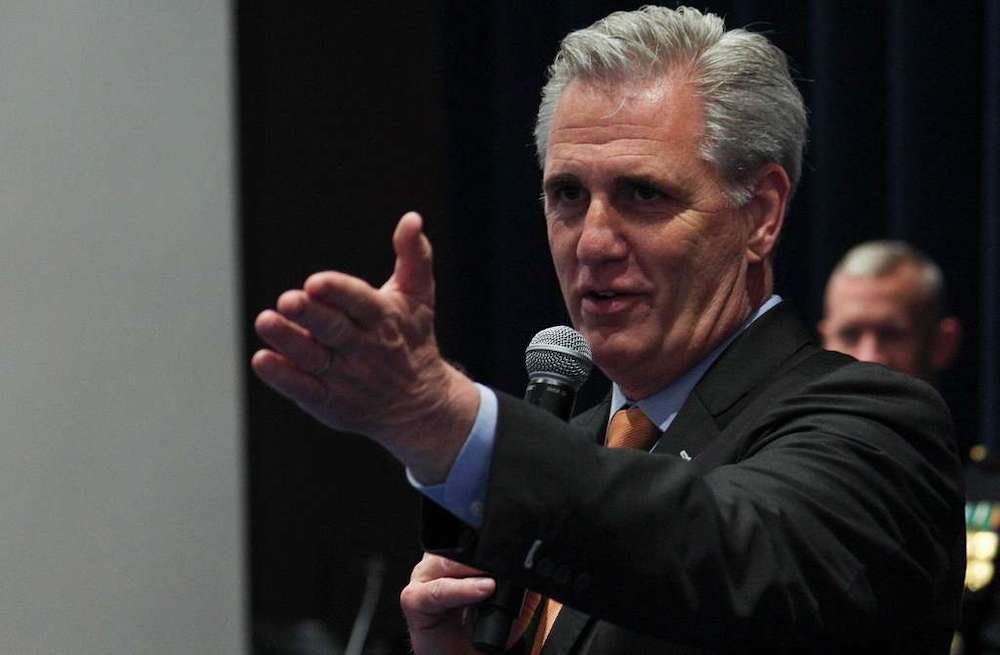
- Details
- By Levi Rickert
Opinion. The GOP-led House of Representatives last week passed the 2023 Limit, Save and Grow Act that would raise the debt limit, slash government spending and roll back key parts of the Biden administration’s agenda. The measure passed the House by a razor-thin margin of 217-215.
While Republicans have voted numerous times to raise the debt ceiling during both Republican and Democratic presidential administrations, this time around they insisted on attaching drastic discretionary spending cuts to domestic programs that benefit average Americans, including Native Americans. Additionally, the bill would cap annual spending growth at just 1% for the next decade.
“We’ve lifted the debt limit. We’ve sent it to the Senate. We've done our job," House Speaker Kevin McCarthy said following last Wednesday's vote.
Democrats, who control the Senate, say the bill is dead-on-arrival. President Biden said he would veto it. That is welcome news because the legislation passed by the House is detrimental for most Americans and bad for the American economy.
The President’s Office of Management and Budget revealed in a statement what the legislation will actually do if implemented: “This legislation would force severe cuts to education (including for students with disabilities), food safety inspections, rail safety, healthy meals for seniors, research on cancer and other diseases, border security, public safety, and veterans’ medical care. It would repeal tax credits from the Inflation Reduction Act that are leading to hundreds of billions of dollars in private sector investment in the United States, creating thousands of manufacturing jobs. It would eliminate President Biden’s one-time student debt-relief plan, depriving more than 40 million hard-working Americans of much-needed student debt relief. It would put food assistance at risk for many older Americans and cause millions of people to lose Medicaid coverage—including working people and people with disabilities. And it would increase energy bills for families, while also increasing pollution.”
The statement also cites a study by Moody Analytics that reports the bill would lead to 780,000 fewer jobs by the end of 2024 and would meaningfully increase the risk of recession.
Since Indian Country is part of the American economy, Native Americans would be negatively affected, as well.
However, the GOP bill’s impact on Indian Country deserves further examination. There is, for example, a huge disparity between the health of American Indians and Alaska Natives (AI/ANs) and that of other Americans. The disparities, which existed prior to COVID-19, were tremendously exacerbated during the pandemic. AI/AN people were three times more likely to be hospitalized from COVID than their White counterparts. Death rates from COVID-19 for AI/AN people were double that of their White counterparts.
Recently, the Centers of Disease Control and Prevention (CDC) reported that life expectancy for AI/AN people has declined almost seven years. The average life expectancy among AI/ANs is now only 65 years, which was the average life expectancy nationwide during World War II.
The GOP’s House bill would cause a loss of federal funding for healthcare in Indian Country.
The National Council of Urban Indian Health (NCUIH) says the Republican House bill, which calls for spending levels to revert back to Fiscal Year 2022 amounts, would cause the Indian Health Service (IHS) to see a 4.7% reduction to $6.63 billion, while the urban Indian line item would see an 18.8% reduction.
NCUIH expresses, rightfully so, that Washington politics about the debt ceiling should not interfere with funding for health in Indian Country.
“The federal government must continue to work towards its trust and treaty obligation to maintain and improve the health of American Indians and Alaska Natives,” NCUIH Chief Executive Officer Francys Crevier (Algonquin) said in a statement last week. “Unfortunately, this legislation proposes senseless cuts at a time when our providers are making strides to improve the health of our communities.”
On Thursday, the National Indian Health Board weighed in on the matter: “In December 2018, the U.S. Commission on Civil Rights’ Broken Promises report found that for decades now, Tribal nations face an ongoing health crisis that is a direct result of the United States’ chronic underfunding of Indian health care, which contributes to vast health disparities between Native Americans and other U.S. population groups.”
Political observers know that proposed spending bills, especially partisan ones, are not about chalking up wins and losses. Instead, they’re about making a statement and revealing what their priorities are for the country. In passing the spending bill last week, the House Republicans revealed they don’t care about the health and well-being of the country, including Indian Country.
Thayék gde nwéndëmen - We are all related.
More Stories Like This
The SAVE America Act Threatens Native Voting Rights — We Must Fight BackThe Presidential Election of 1789
Cherokee Nation: Telling the Full Story During Black History Month
Jesse Jackson Changed Politics for the Better
Native News Online at 15: Humble Beginnings, Unwavering Mission
Help us defend tribal sovereignty.
At Native News Online, our mission is rooted in telling the stories that strengthen sovereignty and uplift Indigenous voices — not just at year’s end, but every single day.
Because of your generosity last year, we were able to keep our reporters on the ground in tribal communities, at national gatherings and in the halls of Congress — covering the issues that matter most to Indian Country: sovereignty, culture, education, health and economic opportunity.
That support sustained us through a tough year in 2025. Now, as we look to the year ahead, we need your help right now to ensure warrior journalism remains strong — reporting that defends tribal sovereignty, amplifies Native truth, and holds power accountable.
 The stakes couldn't be higher. Your support keeps Native voices heard, Native stories told and Native sovereignty defended.
The stakes couldn't be higher. Your support keeps Native voices heard, Native stories told and Native sovereignty defended.
Stand with Warrior Journalism today.
Levi Rickert (Potawatomi), Editor & Publisher

